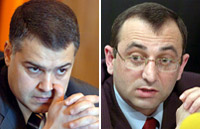The parliament refused to include the issue of founding another ad-hoc to look into the events of March 1 as proposed and suggested by the ARF and Heritage parties.
The ARF recommends to establish a monitoring ad-hoc to observe the implementation of the recommendations in Nikoyan’s report. In contrast, the ARF proposed a recommendation to establish a new ad-hoc to investigate the events of March 1. The speaker of the parliament did not include these proposals in the agenda due to technical reasons. As a reason he referred to the Article 37 of the by-laws as the upper instance, i.e. the committee on state and legal affairs had given a negative conclusion to the drafts. The ARF suggested to include the draft laws in the agenda anyway and referred to the Article 22. As the drafts were not included in the agenda, the ARF faction head Vahan Hovhannisyan suggested to postpone the discussions for 15 days until they consult with the other parliamentary powers as well. “We did not say we were against it, we said we were for such committee, but there was no need to establish a new committee for that purpose. We could impose that responsibility on one of the existing 12 committees,” opposed Hovik Abrahamyan.
It is about the committee on state and legal affairs, which was the one to give a negative conclusion to the draft and prevent its inclusion in the agenda. As a reason the head of the committee Davit Harutyunyan said that according to the law, only one committee could be in charge of one issue. The mentioned by-laws enabled the commission to have that right during the previous discussions. This is the reason why the drafts were not included in the agenda as they say due to alleged technical reasons. At that time the mentioned amendment had not been adopted yet. The mentioned amendment was made before the second reading of the draft, and Davit Harutyunyan was the one to propose it. At the first reading it was introduced as a simple technical recommendation, and at the second reading many MPs did not even understand what they had voted for. Now the NA standing committee has the powers of an ad-hoc as well. However, according to some legislators this law is against the Constitution.
“As a result of amending the NA bylaws the idea, logic and purpose of an ad-hoc was ignored. According to the Constitution, the research of the ad-hoc shall be submitted to the parliament in the form of references and conclusions. But the standing committee can only give a conclusion. I think it jeopardizes the idea of monitoring because the ad-hoc would involve not only representatives of parliamentary committees but extraparliamentary powers, the ombudsman’s office and civic society representatives as well,” says ARF member Artsvik Minasyan, who is one of the co-authors of the draft. According to the MP, the recommendations in Nikoyan’s report concern not only the activities of the 12 standing committees but the entire civic sector. “Accordingly, neither of the parliamentary committee can prevail over the other 11 ones. It is against the principle of maintaining balance. The other violated principle is the fact that the commission looking into the events of March 1 worked based on the principle of consensus but not voting. The coalition that rules the standing committees has majority, and if they think that they should pass a law by voting, they will make them to do so. It means that the meaning of monitoring the recommendation of the committee looking into the events of March 1 will be lost,” says A. Minasyan. He believes the committee on state and legal affairs has violated the parliamentary bylaws and failed to give a conclusion to their drafts during two days. “Now I am blaming that committee for violating the bylaws on purpose to make their attempt to amend the bylaws come true so that they can manipulate their committee in the future,” says A. Minasyan. The logic of the head of the standing commission on state and legal affairs Davit Harutyunyan’s behavior is understandable as he is trying to have some influence on the police, prosecutor’s office and court. In his report Nikoyan suggested to make different changes in the legal, social and other sectors. Davit Harutyunyan decided to use this opportunity and enter these sectors again. By the way, it is not excluded that now he regrets that one and half years ago a commission was established to look into the events of March 1. Definitely Mr. Harutyunyan did not guess at that time that they would be better to amend the NA bylaws to do the work in advance, for which Samvel Nikoyan has been numerously criticized.

